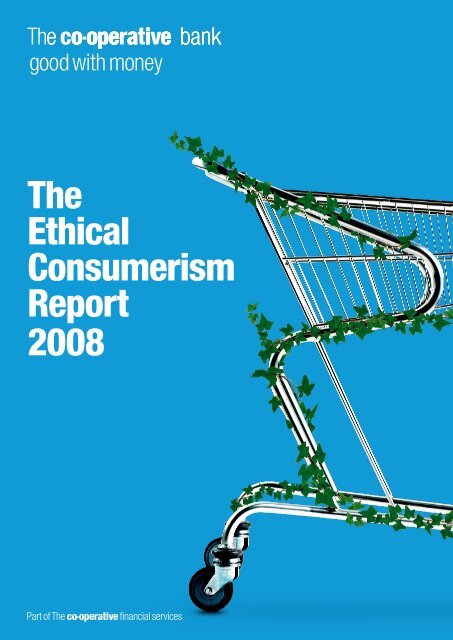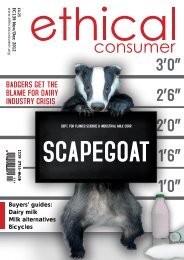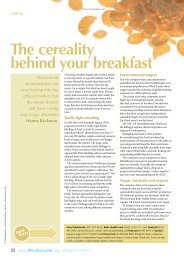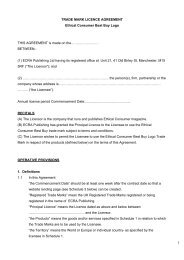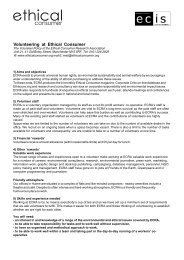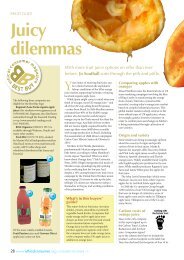The Ethical Consumerism Report 2008
The Ethical Consumerism Report 2008
The Ethical Consumerism Report 2008
Create successful ePaper yourself
Turn your PDF publications into a flip-book with our unique Google optimized e-Paper software.
<strong>The</strong><br />
<strong>Ethical</strong><br />
<strong>Consumerism</strong><br />
<strong>Report</strong><br />
<strong>2008</strong>
Foreword<br />
As the UK economy enters an economic downturn, many<br />
commentators are predicting that consumers will switch<br />
their priority from ‘values’ to ‘value’, bringing an end to the<br />
growth that has been seen in ethical markets over the last<br />
five to six years.<br />
Of course, ethical markets remain small and vulnerable.<br />
However, this report shows that despite the first tremors of<br />
the downturn being felt towards the end of last year, overall<br />
ethical spend in the UK reached £35.5 billion in 2007, up<br />
15 per cent from £31 billion in the previous 12 months.<br />
It would appear that green legislation and choice editing are playing a significant<br />
role in maintaining momentum in the ethical markets. For some time now,<br />
<strong>The</strong> Co-operative Bank has argued that only legislation will secure the necessary<br />
changes to deliver mass market, low carbon lifestyles. We are now seeing that<br />
Government intervention, which promotes energy efficient products such as<br />
boilers, white goods and more recently light bulbs, is underpinning these markets<br />
and ensuring that they continue to grow.<br />
In addition, consumers’ emotional attachment to many ethical products is now<br />
well embedded, and we would argue that these areas will have an advantage<br />
over other markets in a downturn, particularly where the premium for the ethical<br />
choice is relatively low, as with Fairtrade. In addition, some ethical choices appeal<br />
to consumers’ economic sensibilities as much as to their emotions, and energy-<br />
saving products with an economic payback would appear well-placed to deal with<br />
the economic climate.<br />
Of course, the state of the economy will impact on consumer spending and<br />
on ethical markets. However, we would argue that government intervention to<br />
stimulate these markets and further choice editing will ensure that the economic<br />
downturn will not stop the growth of ethical consumerism.<br />
Barry Clavin<br />
<strong>The</strong> Co-operative Bank
Key findings<br />
Last year, on average, every household in the UK spent<br />
£707 in line with their ethical values, up from £630 in 2006.<br />
However, overall ethical spend at £35.5 billion is still a small<br />
proportion of the total annual consumer spend of more<br />
than £600 billion.<br />
•<br />
•<br />
Spending on ethical food and drink, which includes<br />
organic products, Fairtrade goods and free-range eggs,<br />
was up 14 per cent from £5.1 billion to £5.8 billion<br />
Green home expenditure, which incorporates<br />
energy-efficient electrical appliances, green mortgage<br />
repayments, small renewables (such as micro-wind<br />
turbines) and green energy was up 13 per cent from<br />
£5.9 billion to £6.7 billion<br />
% people undertaking the following at least once during the year<br />
Recycled<br />
Supported local shops/suppliers<br />
Talked to friends/ family about a<br />
company’s behaviour<br />
Chose product/service on basis<br />
of company’s reputation<br />
Avoided product/service on basis<br />
on company’s reputation<br />
Bought primarily for ethical reasons<br />
Felt guilty about unethical purchase<br />
Actively sought information<br />
on company’s reputation<br />
Actively campaigned on<br />
environmental/social issues<br />
17%<br />
15%<br />
24%<br />
•<br />
•<br />
26%<br />
25%<br />
Eco-travel and transport, including environmentally<br />
friendly transport, responsible tour operators, public<br />
transport and sales of green cars, was all but flat at<br />
£1.6 billion<br />
Spending on ethical personal products, such as<br />
humane cosmetics and eco-fashion, (e.g. Fairtrade cotton)<br />
was up 4 per cent to £1.3 to £1.4 billion<br />
•<br />
Monies in ethical finance, which includes ethical<br />
banking and investments, was up 15 per cent to stand<br />
at £15.6 billion, up from £13.3 billion last year<br />
29%<br />
38%<br />
35%<br />
36%<br />
33%<br />
44%<br />
51%<br />
51%<br />
47%<br />
61%<br />
59%<br />
61%<br />
58%<br />
57%<br />
59%<br />
57%<br />
57%<br />
73%<br />
83%<br />
83%<br />
96%<br />
96%<br />
<strong>2008</strong><br />
2007<br />
1999
<strong>Ethical</strong> consumerism in the UK, 2006 - 2007<br />
<strong>Ethical</strong> Food & Drink<br />
2006<br />
£m<br />
2007<br />
£m<br />
Organic 1,737 1,911 10<br />
Fairtrade 285 458 61<br />
Free range eggs 259 314 21<br />
Free range poultry 116 130 12<br />
Farmers’ markets 225 220 -2<br />
Vegetarian products 664 826 24<br />
Freedom foods 18 28 56<br />
Sustainable fish 55 70 27<br />
Dolphin friendly tuna 223 237 6<br />
Food and drink boycotts 993 1,144 15<br />
Eating out boycotts 543 500 -8<br />
Sub-total 5,118 5,838 14<br />
Green Home<br />
Energy efficient electrical appliances 1,824 1,888 4<br />
Energy efficient boilers 1,471 1,794 22<br />
Micro-generation 32 36 13<br />
Green mortgage repayments 396 404 2<br />
Energy efficient light-bulbs 26 41 58<br />
<strong>Ethical</strong> cleaning products 34 38 12<br />
Sustainable timber and paper 696 1,019 46<br />
Green energy 127 174 37<br />
Rechargeable batteries 42 75 79<br />
Buying for re-use - household products 1,330 1,291 -3<br />
Sub-total 5,978 6,760 13<br />
Eco-travel and Transport<br />
Public transport 377 475 26<br />
Responsible tour operators 103 110 7<br />
Environmental tourist attractions 18 22 22<br />
Green cars 96 223 132<br />
Travel boycotts 1,030 817 -21<br />
Sub-total 1,624 1,647 1<br />
<strong>Ethical</strong> Personal Products<br />
<strong>Ethical</strong> clothing 52 89 71<br />
<strong>Ethical</strong> cosmetics 386 448 16<br />
Charity shops 224 184 -18<br />
Buying for re-use - clothing 421 360 -14<br />
Clothing boycotts 281 338 20<br />
Real nappies 4 4 0<br />
Green funerals 22 26 18<br />
Sub-total 1,390 1,449 4<br />
Community<br />
Local shopping 1,607 2,135 33<br />
Charitable donations 1,951 2,072 6<br />
Sub-total 3,558 4,207 18<br />
<strong>Ethical</strong> Finance<br />
<strong>Ethical</strong> banking 5,551 6,125 10<br />
<strong>Ethical</strong> investment 7,223 8,926 24<br />
Credit unions 462 482 4<br />
<strong>Ethical</strong> share holdings 55 65 18<br />
Sub-total 13,291 15,598 17<br />
Grand Total 30,959 35,499 15<br />
% growth<br />
2006-2007
About this report<br />
<strong>The</strong> Co-operative Bank’s <strong>Ethical</strong> <strong>Consumerism</strong> <strong>Report</strong> has<br />
been produced for nine consecutive years and acts as a<br />
barometer of ethical spending in the UK.<br />
In this report, ethical consumerism is defined as personal<br />
allocation of funds, including consumption and investment,<br />
where choice has been informed by a particular issue<br />
– be it human rights, social justice, the environment or<br />
animal welfare.<br />
Further information<br />
<strong>The</strong> <strong>Ethical</strong> <strong>Consumerism</strong> <strong>Report</strong> <strong>2008</strong> was produced<br />
by <strong>The</strong> Co-operative Bank, with additional research by<br />
the <strong>Ethical</strong> Consumer Research Association (ECRA). This<br />
booklet represents the authors’ personal opinions and<br />
interpretation of the subject and not the views, opinions or<br />
policies of <strong>The</strong> Co-operative Bank.<br />
This booklet may not be reproduced without the express<br />
permission of <strong>The</strong> Co-operative Bank or the authors.<br />
Previous <strong>Ethical</strong> <strong>Consumerism</strong> <strong>Report</strong>s are available at:<br />
www.goodwithmoney.co.uk/<br />
ethicalconsumerismreport<br />
For further information contact:<br />
Ryan.Brightwell@co-operative.coop<br />
We would like our report to have an impact on you – but not on the environment.<br />
Which is why this is printed using vegetable oil-based inks on 100% recycled paper,<br />
made in a totally chlorine-free process. I’m not finished! Please recycle me.<br />
<strong>The</strong> Co-operative Bank p.l.c., Head Office, P.O. Box 101, 1 Balloon Street, Manchester, M60 4EP.<br />
Registered No. 990937 www.co-operativebank.co.uk<br />
Figures comprise sales data and values attributable to<br />
ethically motivated behaviours (such as boycotts) as<br />
determined by the annual Co-operative Bank <strong>Ethical</strong><br />
Household Spend Survey. For the 2007 survey, the total<br />
sample size was 1,065 adults. Fieldwork was undertaken<br />
between 13th and 17th September 2007. <strong>The</strong> survey was<br />
carried out online. <strong>The</strong> figures have been weighted and<br />
are representative of all GB adults (aged 18+).<br />
With thanks to: YouGov, GfK Marketing Services,<br />
DEFRA, BUAV, FSC, <strong>The</strong> Fairtrade Foundation,<br />
www. responsibletravel.com, EIRIS Services Ltd, Energy<br />
Saving Trust, ETA, ClearSkies, IFAT, the Vegetarian<br />
Society, BEIS, Pesticides Action Network (PAN), the<br />
Housing Association, <strong>The</strong> Soil Association, Organic<br />
Monitor, RSPCA, MSC, Earth Island Institute, ABCUL.<br />
ONS data source: National Statistics website:<br />
www.statistics.gov.uk. Crown copyright 2006 – Published<br />
with the permission of the Controller of Her Majesty’s<br />
Stationery Office (HMSO).


